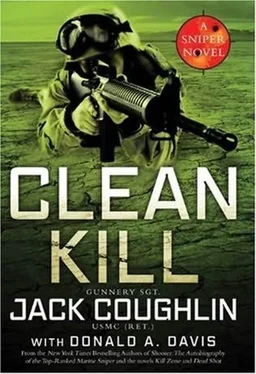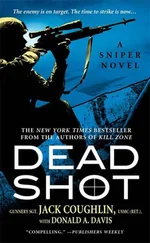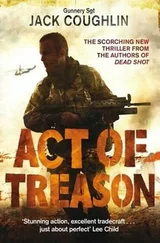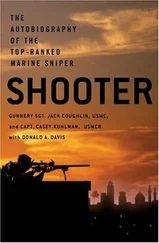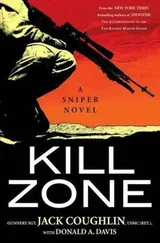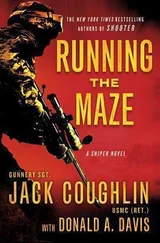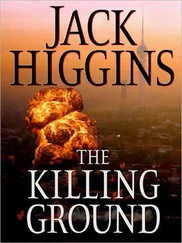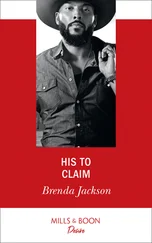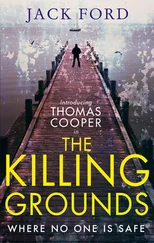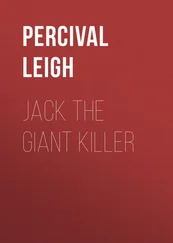“Trouble, Boss,” said Jamal. “Police roadblock.”
“Turn through the alley,” said Boykin. “We’ve seen enough here. Those are cops, not soldiers, obviously there to stop people from being too curious about those trucks.”
Jamal waved to the few uniformed men at the roadblock as he made the turn and accelerated away. “You guys stay low. We don’t want to be showing white faces around here,” Jamal said. “I’ll take a shortcut back to the foreign compound. Then we can head south to the missile base.”
The first rock sailed up from behind them and clattered on the metal roof of the van, followed by a flurry of stones and bricks from the sides. “Gangs of kids are coming from all around. Get us out of here,” Boykin called.
Rocks and soda cans and debris of every sort rained from the rooftops, doorways, and the mouths of alleys as the minivan passed. No adults were out, just kids, their eyes wide in excitement, bombing Satan.
“What the fuck? Are we in Somalia?” yelled Kyle, covering his head with one hand and grabbing the pistol with the other. A rock the size of a softball smashed through the back window. People whistled and yelled.
“We ride out here all the time and never have trouble. These people know us,” Jamal responded, spinning the steering wheel. They flew around another corner and the crowd disappeared, evaporating as if nothing had happened. “The kids are the early warning system to keep outsiders away from the mosque,” he said. “Something’s coming down.”
A FEW MINUTES LATER,Jamal drove through the gate to the foreign compound, nodded to the single soldier on guard, and entered a different world. It was a neat layout with straight roads and cookie-cutter, Western-style homes, cars in the driveways and TV satellite dishes bolted on the rooftops, a complete opposite of the nearby communities of square mud huts interspersed with a few grand homes of the local residents. The people of the desert lived out beyond the wire.
“Mostly only guys are still living here,” Boykin explained. “Khobz is not pleasant for Western women, and absolutely no place to try to raise a kid because the muttaween religious cops rule outside the fence and really influence what can go on inside this perimeter, too. This is not a diplomatic quarter with any sort of immunity, so Saudi law rules. Families are better off in nearby countries where Daddy can go see them on a long weekend and spend the big oil paychecks.”
Many of the houses seemed empty and forlorn with no lights on, although darkness was beginning to fall. Kyle mentioned the exodus at the airport and Boykin said that unofficial withdrawal had been going on for several days. “Anybody with a brain and a choice is leaving,” Homer said.
The supermarket in the mall was still open, but the bowling alley was closed, as were the public swimming pools and the clubhouses, as if the little community was holding its breath.
“We need to pick up anything from our house, Homer?” Jamal asked, pausing at the driveway of a two-bedroom home that was identical to its neighbors in every way.
“No. We’re good. Let’s get on out to the military pad before the light gives out.”
Kyle shook his head. “Let’s not. Judging by what we just saw, they won’t let us anywhere near the place and we don’t want to seem to be overly curious. I can go out tonight for a look.”
Homer said, “Okay, if that’s what you want. You up for some pizza?” he asked. “Got a place down by the beach run by a Chinese family. They operate 24/7 because the oil business never shuts down. Make more money selling thick crust slices than they would sweating out on the rigs. We’ll pick some up and go back to the shop.” He took out his cell phone and hit a speed dial number for Dragon Pizza. “Hope you ain’t a vegetarian.”
They returned to the safe house with two large pizzas stacked with meat and redolent with onions and peppers, went through the steel door and down to the basement. Boykin grabbed a slice as he booted up his computer, typed in his password and checked the e-mails. Nothing.
Jamal was telling a joke about camels when his cell phone rang with a Stones tune. He looked at the caller ID, raised his eyebrows and answered, “The Boykin Group.” He listened, closed the connection without responding and tossed the phone on a counter.
“The convoy is leaving the mosque,” he said, stuffing one more bite of pizza into his mouth and opening the armory cage. The first salvo of explosions could be heard dully stomping around the foreign compound.
Jamal and Homer actually watched Kyle Swanson change before their eyes, as if some motion picture special effect stunt was turning an ordinary man into an icy machine. A steadiness settled over him like a cloak and his eyes sparkled, the mind racing. He was instantly amped and ready, went into the armory cage for an MP5 submachine gun and a couple of spare magazines. He also picked up a set of bolt-cutters and a combat knife. Jamal handed him a headset radio.
“I’m going to use the noise and distraction as cover to check out the missiles.” Swanson was up the stairs and gone.
Homer finished the pizza while helping Jamal load up the van.
RIYADH
A FEW HOURS AFTERdark on the day the king was murdered, small processions of expensive automobiles began to arrive at a restaurant on the outskirts of Riyadh. As usual, the chairs around small tables on the sidewalk out front were occupied by men drinking sludgy gahwa Arabian coffee from tiny cups and sharing the pipes of hookahs filled with rosewater. The men were the outer cordon of guards for the meeting that was about to take place on the second floor of the plain-looking building.
Personal representatives for six of the most powerful men in the kingdom of Saudi Arabia arrived separately, with their own bodyguards, and moved through the tables, beneath an archway and through a double-door that opened into a bland dining area lit only by strings of naked 100-watt bulbs that dangled from loose cords. Other guards, these openly carrying weapons, were in the corners. The restaurant owner welcomed the men in turn, and passed them through the downstairs area to a staircase that ascended to the second floor. Their retinues and personal bodyguards were left downstairs. Only six men were allowed up.
The principals did not attend because even with the safeguards that were in place, it was the kind of tense evening when long knives might flash. The half-dozen men who went up the dusty stairs represented the royal family, religion, the military, major nonpetroleum business interests, the tribes, and oil.
There was an immense difference between this room and the rest of the building. It was brightly lit, neat and clean. In one corner was a fully stocked bar that included exclusive brands of alcoholic beverages. A large round table occupied the middle of the room, with six chairs spaced evenly around it, the places marked by sealed bottles of water. A feast of food was spread in the middle: plates of fresh pita bread, bowls of spices, falafel, rice, hot peppers, and mutton and other meats that had been vertically roasted on spits.
The group was gathering for the most urgent of reasons, to decide who would be their next king, but Arab tradition required a certain informality that showed friendship, respect, and honor. Only when the men had helped themselves to the food and drink and exchanged small talk about their families could they get down to business. No one was technically in charge.
The talk did not get around to the business of the night for almost an hour, until Prince Aziz, a minor member of the royal family, tore off a final bit of pita, rolled it around a chunk of rice and lamb, dipped it into a spicy mixture and shoved it into his mouth. He chewed, swallowed, licked his fingers, and gave a loud burp. His demonstrated appreciation of the fine meal marked the end of the first phase of the meeting and a termination of the uneasy politeness. The belch was a starting signal to launch the serious discussion.
Читать дальше
